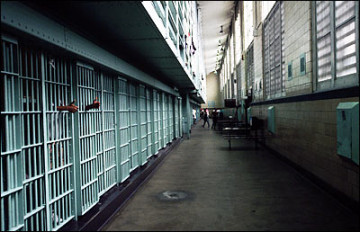slides: Rhode Island Attorneys Unethical Conduct - Top Ten Cases
Thursday, May 14, 2015
Stephen Beale, GoLocalProv News Contributor
From fraud and conspiracy to booze and big lies, here are the most notable recent cases of attorney misconduct in Rhode Island.
Related Slideshow: Attorneys Disciplined by the State Supreme Court
Below are the top ten most egregious cases of attorneys who have been before the state Supreme Court over the past year and a half because of public misconduct or private misdeeds that undermined their public reputation. All cases except one involve some kind of reprimand. The exception is one attorney who was readmitted to the bar. That case is included because of the potentially controversial circumstances of his reinstatement, which sparked the dissent of one justice. The basis for the below summaries is the Supreme Court orders issued in the cases. That information was supplemented with other court records, media reports, and other similar sources when necessary. For each case, the name of the attorney involved and the date the state Supreme Court took action are listed.
 View Larger +
View Larger +
Disbarred over Bar Bribe
Gordon Fox
April 2, 2015
Case Description: Once Rhode Island’s most powerful politician, Gordon Fox in March pled guilty to receiving more than $52,000 in bribes from Shark Bar and Grille on Thayer in exchange for voting in favor of a liquor license. Fox had also filed false campaign finance reports to cover up his personal use of those funds. One month after his guilty plea, Fox voluntarily consented to disbarment before the Rhode Island Supreme Court but he can apply for his law license in five years.
 View Larger +
View Larger +
Cashing in on the Elderly
Thomas J. Howard
February 24, 2015
Case Description: When an elderly woman hired Thomas J. Howard to handle her financial affairs, he treated her funds ‘as his private ATM,’ according to a state Supreme Court order. At the time of his hiring she had assets worth $60,827. But that shrunk down to $35,977 by the time Howard was done with it, thanks to exorbitant fees. When pressed to explain how he justified those charges, Howard could not produce contemporaneous billing records, which had either been ‘lost or inadvertently destroyed.’
The court also concluded that, “The respondent [Howard] wrote checks from [the elderly woman’s] account payable to ‘cash,’ which he then cashed for his own use. He also wrote checks to third parties from [her] account to make payments of his own expenses.” But some of her funds were left untouched, literally: her pension checks, which amounted to a paltry $123.42 a month. Howard failed to deposit the checks, which were returned to the sender.
 View Larger +
View Larger +
Booze-Fueled Felonies
Steven A. Murray
February 24, 2015
Case Description: In July 2012, Steven A. Murphy was arrested by Coventry police on four felony charges including second degree sexual assault and assault with a weapon, according to a state Supreme Court order and locally published police logs. Murphy later pled no contest to the assault charge while the other three were dismissed, according to the court. He also pled no contest to a misdemeanor DUI charge on the same day, the court noted. Because Murphy was ‘seriously intoxicated’ during the first incident, the court opted for leniency, suspending his license to practice law for 18 months.
 View Larger +
View Larger +
Fishy Funding
Leonard L. Bergersen
October 14, 2014
Case Description: When attorney Leonard L. Bergersen was entrusted with holding $28,000 in escrow for a client couple, he took out more than two thirds of the funds for himself, according to the state Supreme Court. When those clients later requested that Bergensen make payments from the escrow account to a bank, no money was left. That was no problem for Bergensen: he just took out $20,000 from another escrow account he held for a business, Jennifer Fisheries, to cover the payments requested by the other clients. The shortfall was not discovered until Jennifer Fisheries hired another attorney to represent it in federal litigation. Bergensen later paid back the money and revealed that a battle with depression had compromised his judgment. Still, the state Supreme Court suspended him for 18 months.
 View Larger +
View Larger +
Two Bills Double Trouble
Jose Luis Serpa
June 11, 2014
Case Description: Jose Serpa charged an ‘illegal fee’ to an ‘indigent client’ who had been charged with a DUI, driving without a license, and leaving the scene of property damage in Massachusetts, according to the state Supreme Court. That may not be the worst part of it. Serpa was actually double billing: he charged his client after already being promised compensation from a state agency that provides public defenders. And, Serpa charged his poor client four times as much as the compensation to which he was officially titled, a difference of about $2,000 to $450, according to the court record. After Massachusetts officials suspended his license in May 2014, the Rhode Island Supreme did the same. His client meanwhile got a new trial and later had the charges dismissed.
 View Larger +
View Larger +
Behind Bars to the Bar
John M. Cicilline
May 1, 2014
Case Description: This case stands out because the attorney in question was readmitted to the bar. John M. Cicilline, the brother of Congressman David Cicilline and son of famed local lawyer John F. Cicilline, lost his license to practice law in late 2008 after pleading guilty to conspiracy, obstruction of justice, and making false statements. The charges stemmed from a case in which Cicilline promised to help a client get a reduced sentence after an arrest for possessing a large amount of marijuana. The idea was that the client would provide federal authorities with information on another drug dealer. The problem? The client had no such information.
“The petitioner coached his client about how to present that false information to federal authorities,” the state Supreme Court said. Meanwhile, his client had found a better way to secure a reduced sentence: by helping federal authorities build a case against him and his law partner, Joseph A. Bevilacqua Jr., the son of the former state Supreme Court justice Joseph A. Bevilacqua. Cicilline would later go on to serve 18 months in federal prison.
Cicilline’s return to the bar was narrowly approved with three justices voting in favor. One justice, Gilbert V. Indeglia, had to recuse himself because his nephew, Vincent Indeglia, was representing Cicilline. The fifth justice, William P. Robinson III, dissented. “After much soul-searching and after meticulously reviewing the petition submitted by Mr. Cicilline and the accompanying supporting materials, I am unable to conclude that the petitioner has successfully borne ‘the burden of demonstrating by clear and convincing evidence’ that, at this point in time, he has satisfied the demanding criteria for readmission,” Robinson wrote.
 View Larger +
View Larger +
Over the Line
Layne Savage
May 1, 2014
Case Description: What do you do when your driver’s license has been suspended in one New England state? For local attorney Layne Savage, the solution was simple: just go for a short drive to a neighboring state and get a new one.
When Savage was arrested in East Providence on a DUI charge and refusal to submit to a chemical test, she had her license suspended in January 2013. On the very same day, four hours later, Savage was at the DMV office in Fall River, Massachusetts, applying for a driver’s license using the Massachusetts address of an apartment she had just started leasing—the day before. When filling out her application form, Savage was asked if her right to drive had been suspended anywhere else. She wrote ‘no’—a statement she had to affirm was correct under penalties of perjury. Savage got away with her caper for just a few months. In May 2013 she had to surrender her Massachusetts license too.
 View Larger +
View Larger +
Phantom Law Office
Daniel J. Saxton
April 4, 2014
Case Description: Tired of unsolicited junk mail? Usually a simple toss to the trash bin and problem solved. But this case was so egregious that the Rhode Island Supreme Court decided to get involved.
It began when Providence residents started getting letters from a law firm warning that their homes were at risk of being auctioned off. The letters were from a law firm named Freeman Saxton, P.C., which is in Atlanta, Georgia, but claimed to have an office at 20 Weybosset Street in downtown Providence. Except that address does not exist. The closest address is 24 Weybosset Street, which happens to house the offices of the state judiciary’s Disciplinary Counsel for attorneys. Oops.
The letters also had a local telephone number. But when state officials dialed it, it went to an Atlanta office, which told the official to visit the Providence office—but only by appointment. When confronted directly the attorney gave another fake address to state authorities. Even though Saxton is not a member of the Rhode Island bar and does not have an office here, the state Supreme Court ruled that he had submitted himself to its jurisdiction by his activities and ruled that he owed pro bono legal services to a dozen George residents—matching the number of Rhode Island residents whose business he had solicited. The work would be monitored by a foundation in Georgia.
 View Larger +
View Larger +
Insurance Scheme
Joseph Caramadre
February 20, 2014
Case Description: Local attorney Joseph Caramadre made national headlines four years ago for his indictment in an insurance scheme in which he paid terminally ill individuals $2,000 in order to set up annuities and bonds in their names, in which associates of Caramadre invested. When the terminally ill individuals died, the investors received payouts from the bonds, according to media reports describing the arrangement. Caramadre reportedly said he was simply profiting off a loophole the small print of annuity rules. Federal prosecutors saw it differently: in 2011, he was charged with several felony counts of violating federal law. Two years later, he pled guilty to wire fraud and conspiracy and was sentenced to six years in prison in 2013. But it was not until about a year ago that his license to practice law was suspended, pending the outcome of the appeal he has filed.
 View Larger +
View Larger +
License to Steal
Benjamin Wyzansky
November 14, 2013
Case Description: Benjamin Wyzansky, a Pawtucket-based real estate attorney, was sentenced to prison and order to make restitution, for over $350,000 he took from money that was meant to pay off a home loan for a client. He ended up getting three years in prison—approximately one for each $100,000 that he stole. At his sentencing Superior Court Judge Netti Vogel said that Wyzansky had “used his license to practice law to steal.” He lost that license on November 14, 2013.
Related Articles
- Booze, Assault, and Fraud: RI Attorneys Behaving Badly
- NEW: Former Attorneys General Lynch & Pine Announce New Firm
- Booze, Bribery, and Conspiracy: Rhode Island Attorneys Behaving Badly
- LISTEN: Rhode Island Attorneys Behaving Badly
- Booze, Bribes, and Conspiracy: RI Attorneys Disciplined by State Supreme Court
- Rhode Island Attorneys Behaving Badly - The Top Ten













